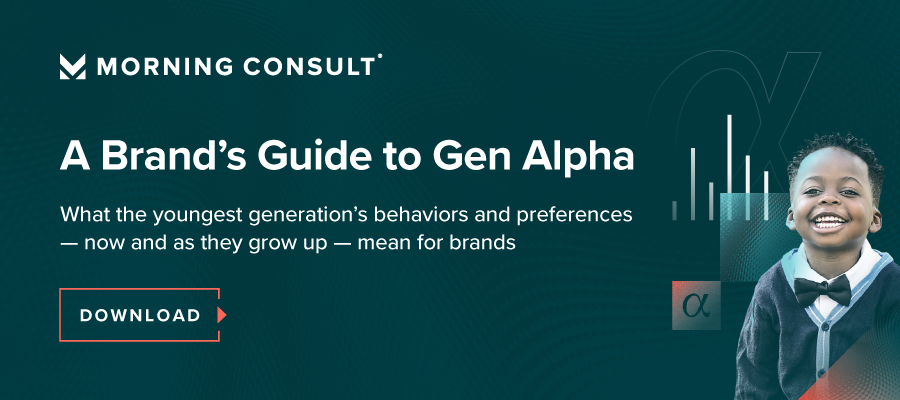For more insights on Gen Alpha, download the full report.
Gen Alpha may be better than previous generations, except for their mental health.
According to their parents, whom we surveyed for our latest report, A Brand Guide to Gen Alphato better understand the next generation of consumers.
Gen Alpha, aged 0-9, was raised during the confluence of many events in a lifetime: historic inflation, an unresolved pandemic and ongoing technological breakthroughs. All these elements greatly influence how their parents raised them – and how this youngest generation sees the world.
Below, we unpack four of our key takeaways from our latest report.
Parents believe that Alphas are better than before, but not when it comes to mental health
Gen Alpha parents believe their children are luckier than previous generations, with two important caveats: their mental health and, to some degree, physical health.
Share of parents who said that, compared to previous generations, their children aged 9 and under are better or worse in each of the following aspects because of the modern-day internet access and technology:
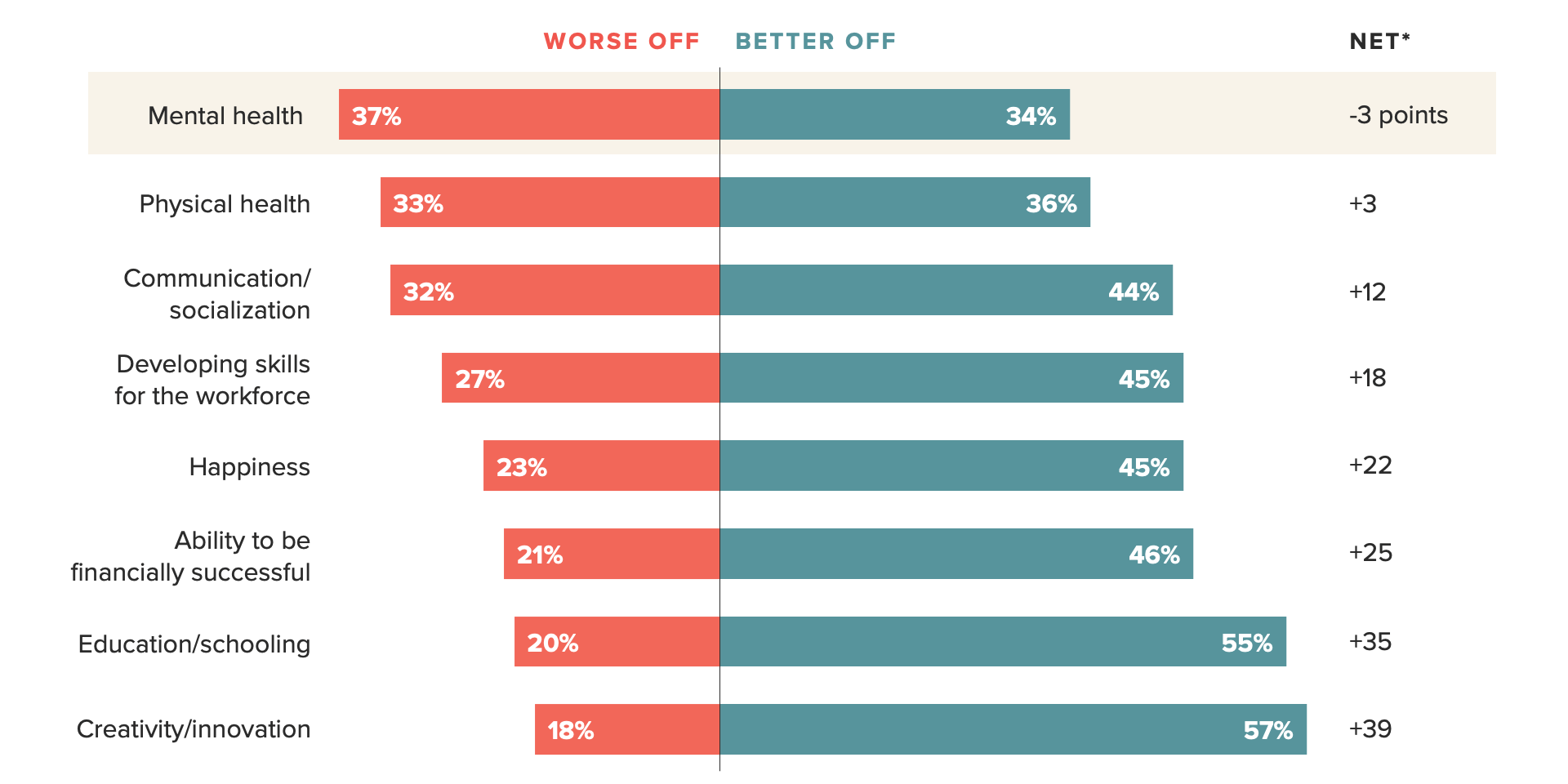
Survey conducted December 10-20, 2022, among a representative sample of 2,001 parents with children under the age of 9, with an unweighted margin of error of +/-2 percentage points. *The net figure represents the share who say their children are better off minus the share who say their children are worse off. “No difference” and “Don’t know” responses are not shown.
Parents are more likely to say that Alphas’ mental health is worse (37%) than better (34%). We saw a similar divide when asked about the physical health of Alphas, although they were slightly more likely to say that the children were better.
Much of this we can credit to COVID-19. The pandemic upends any “normal” childhood many Alphas may have had, negatively affecting mental health development and putting a new focus on physical health.
That said, while the pandemic also inhibits social development, Gen Alpha parents don’t report much concern: 44% say their children are better in terms of communication and socialization than previous generations generation, while 32% said the opposite. Perhaps some of this is because Gen Alpha is joining, and in some cases building, online communities.
Most Alphas have a tablet, and their future points to virtual reality
Gen Alpha is the first fully digital generation. Their digital fluency has high rates of device ownership, screen time and online friendships.
Shares who said their children possessed the following:
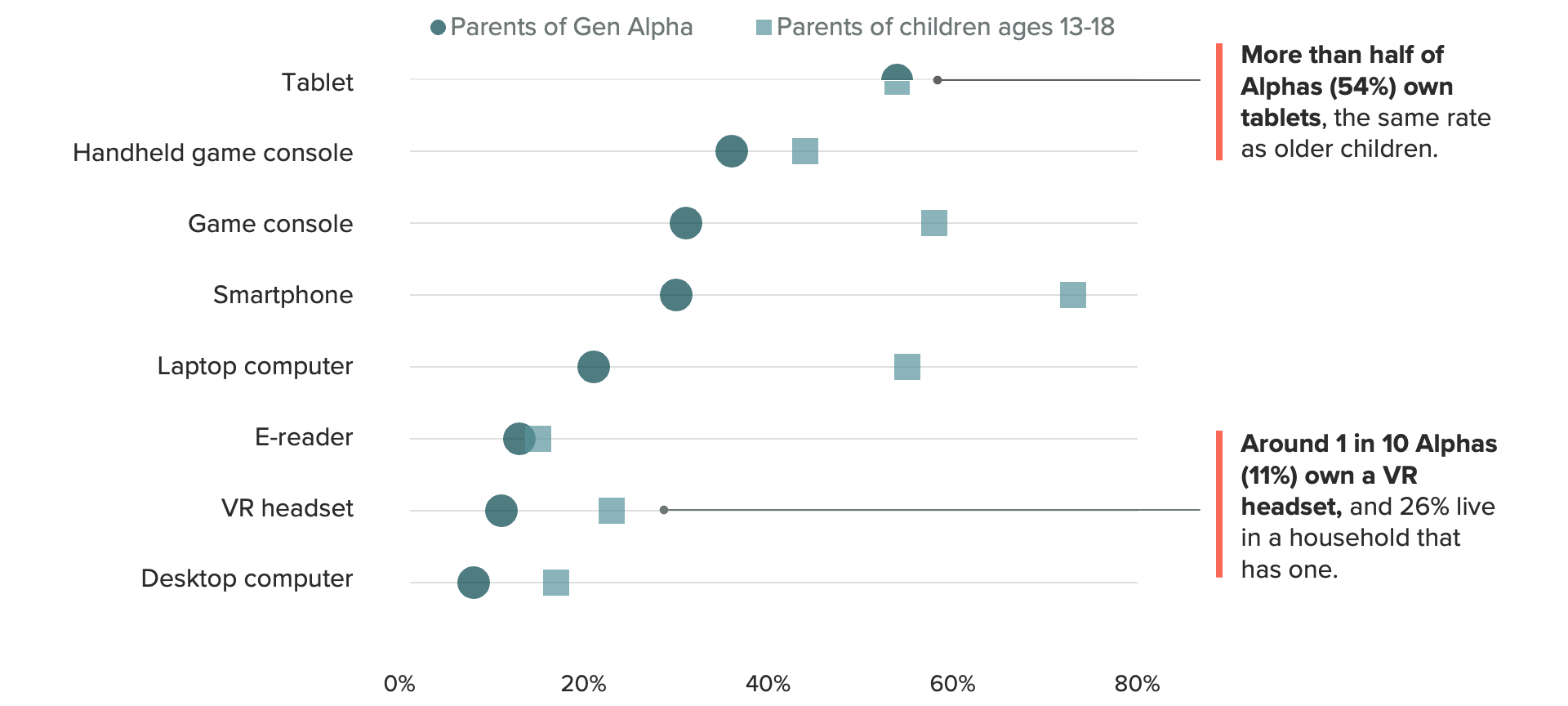
The surveys conducted December 10-20, 2022, among a representative sample of 2,001 parents with children under the age of 9, with an unweighted margin of error of +/-2 percentage points, and December 10-19, 2022, among a representative sample of 1,000 parents with children under the age of 18, with an unweighted margin of error of +/-3 percentage points.
Tablets are the most popular devices among Gen Alpha, owned at the same rate as older kids, suggesting that handheld devices’ larger screens and responsive apps will hold a a more important place than what they have done.
About 1 in 10 Alphas (11%) own a VR headset, and 26% live in a household with one. More Gen Alpha kids are growing up with VR — a potentially good sign for the companies’ long-term metaverse games.
Alphas spend the most time on smartphones, desktop computers and VR. While tablet ownership is the highest, VR headsets and desktop computers get the most screen time. Nearly a fifth (17%) of Gen Alpha parents whose children own VR headsets said their children use them more than seven hours a day, and 18% said that same for desktop computers.
Nowadays online equals strong online communities for Gen Alpha. About one-third (34%) of Alphas regularly interact with their friends online through games or messaging apps, according to their parents.
Thanks to the prevalence of these communities, nearly a quarter (24%) of Gen Alpha parents said their children have friends they’ve met online that they’ve never met in person, and about 2 in 5 (41%) also said that online games have a positive effect on the socialization of their children.

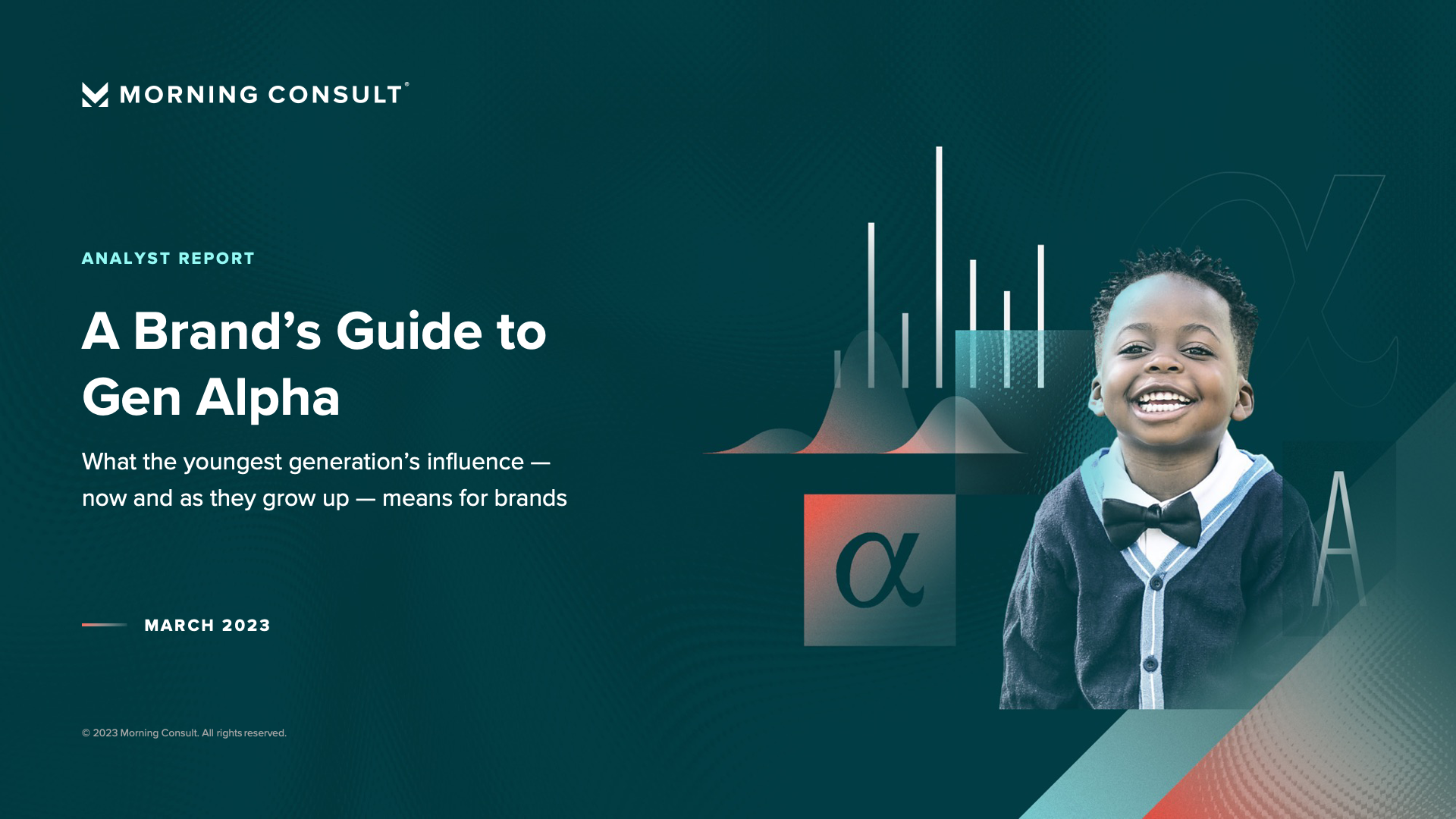
Alphas already influence purchasing, especially in food and beverages
Gen Alpha has a strong brand affinity, especially in what they eat and what they watch. Less than half of the generation’s parents report that their children ask for their favorite brands in these categories, usually by age 7. Preferences for electronics, video games and restaurants emerge later, closer to age 8-9. Clothing brands emerge at age 10 as children approach the treacherous preteen years.
Shares of parents who say their children want a specific brand in each of the following categories:
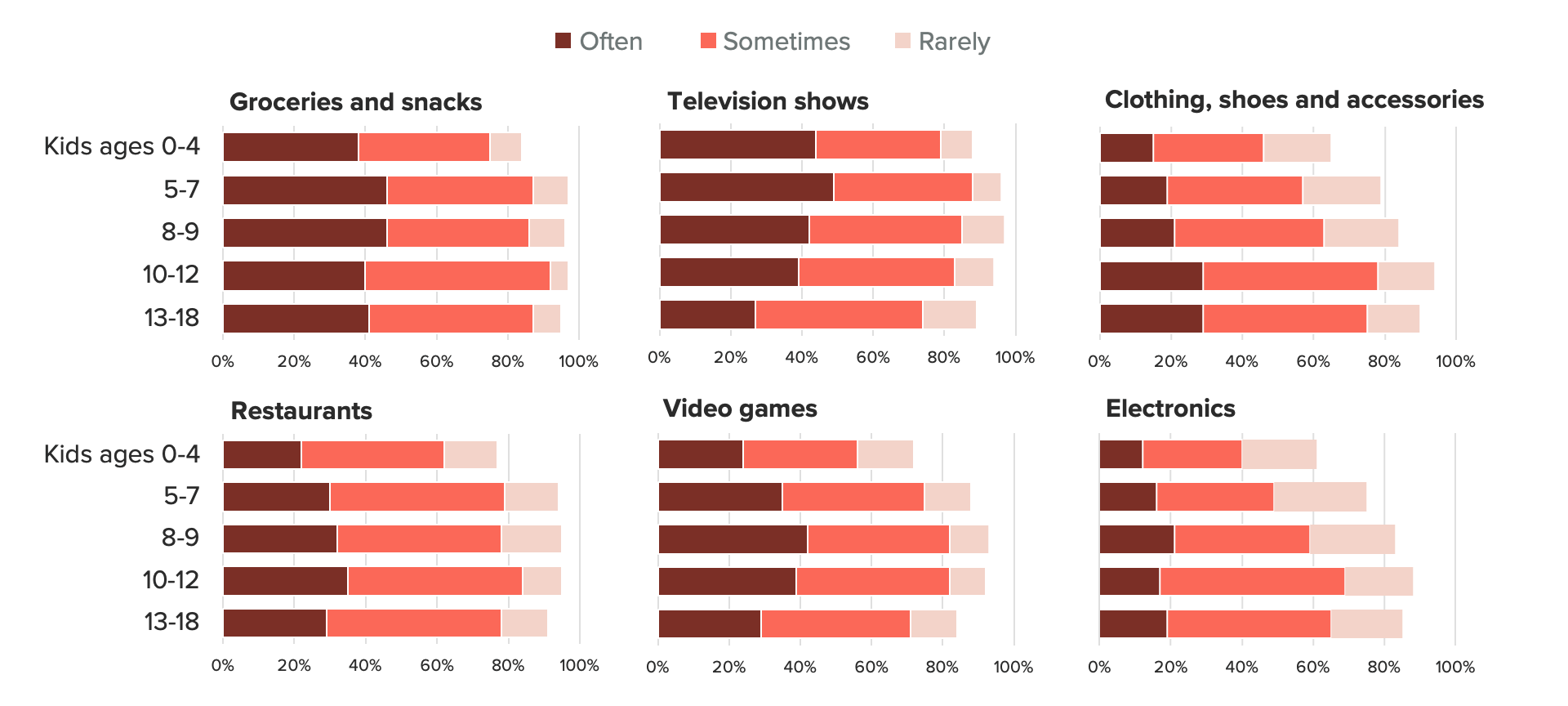
The surveys conducted December 10-20, 2022, among a representative sample of 2,001 parents with children under the age of 9, with an unweighted margin of error of +/-2 percentage points, and December 10-19, 2022, among a representative sample of 1,000 parents with children under the age of 18, with an unweighted margin of error of +/-3 percentage points.
The decline in specific brand requests after age 13 does not mean that children do not have brand preferences at that age. Instead, teenagers start to have some of their own independent purchasing power and don’t need to ask their parents for specific brands – plus, their parents already know what they’ve built. brand preferences.
Gen Alpha parents worry about finances
Using cluster analysis, we identified three unique groups of Gen Alpha parents based on what they said were the most important factors to think about raising their children. The largest group is called “the financial crowd.”
Significant differences in average utility scores between the three unique groups of Gen Alpha parents and all Gen Alpha parents in a MaxDiff analysis

Survey conducted December 10-20, 2022, among a representative sample of 2,001 parents with children under the age of 9, with an unweighted margin of error of +/-2 percentage points.
This group makes up 47% of Gen Alpha parents, and since they are the youngest group as well, we see them as an indicator of where the group will move as Alphas continue to be born. Their average utility scores for the phrase “It is important that my children are financially successful” are higher than all Gen Alpha parents, indicating that they place more importance on financial success their children.

